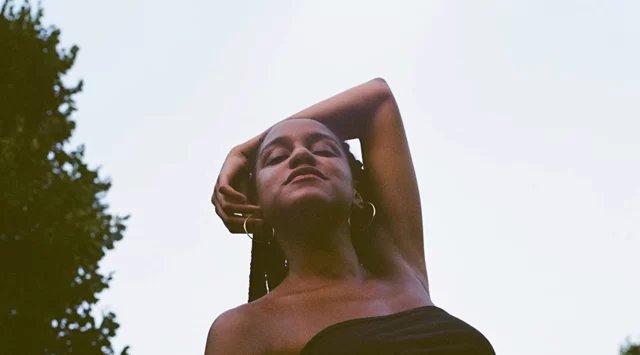Beba: All the Heartaches I Conceal, by David Bax

If the type of person who’s only able to articulate the most superficial elements of both a film and their own reaction to it (in other words, a shockingly large amount of people who talk about movies) were to describe Rebeca Huntt‘s Beba, it might sound boring. Or worse, it might sound familiar, a movie with clear analogs to other biographical documentaries of ordinary people with extraordinary stories. Or, to a cynic, it might sound overly navel-gazing. A movie where the director interviews her own parents about her childhood? How narcissistic! Except the point of these interviews is not for Huntt to self-aggrandize. It’s to watch, for instance, how she regresses into a quarrelsome child when trying to question her own mother. Beba is a self-portrait made by an unforgiving artist.
Another kind of self-portrait, when it takes a narrative form, is the memoir. That’s probably a more fitting descriptor of Beba than “documentary.” Huntt is not telling you who she is. She’s letting you come to know who she is through her story. Her chapters–childhood summers in the Dominican Republic; befriending the children of wealthy families during her years at Bard–are not encyclopedic overviews of her life but rather layers that have to be pulled back to reveal the secrets that Huntt wisely never lets on are waiting for us.
As implied by the word “chapters,” Beba is a structurally recognizable documentary, relaying Huntt’s life story in chronologically ordered chunks. But aesthetically, it takes on something approaching the form of a collage. Pieces of colorful imagery and movement are pulled from the library of footage Huntt has clearly been shooting most of her life, decontextualized and then placed alongside one another to create new meanings and effects.
All of this is accompanied by Huntt’s own narration. It’s clear that she is not a professional voice artist but that’s to Beba‘s benefit. The whispered, sometimes hesitant tones of the voiceover add intimacy.
Huntt grew up in a lower middle class family living in an upper middle class neighborhood. She grew up an Afro-Latina with a father from the DR and a mother from Venezuela. She grew into a viciously intelligent and (as she seems very aware while refraining from saying as much) beautiful woman. Beba is a film about how the things that we are shape us but don’t entirely define us. But, like most great films, it doesn’t just explain that. It makes us feel it, very nearly transporting us behind Huntt’s eyes to understand what it might be like to be someone else.
If I have one complaint about Beba, it’s the use of Doris Wilson’s “Big Flame” on the soundtrack. It’s a great song but it’s too strongly associated with I Think You Should Leave, a show that, to understate things, has a very different vibe.



























